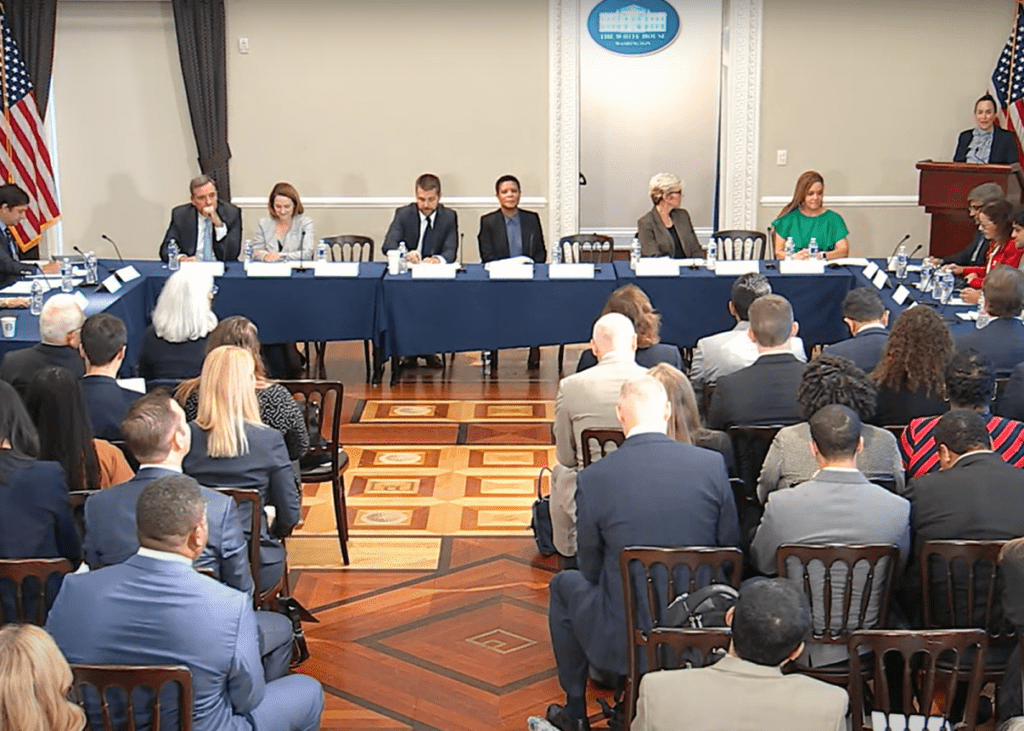Top White House officials engaged with leaders in the biotech industry yesterday in a summit covering the future of biotech and details of the executive order on biotechnology and biomanufacturing that President Biden signed Monday.
The executive order is backed “with funding of more than $2 billion” the White House said yesterday, and agency heads described specific actions:
- Health and Human Services actions include: supporting research programs and other development at the FDA, forwarding global regulatory harmonization, facilitating innovative animal products developed through biotech, and investing $40 million toward biomanufacturing of “active pharmaceutical ingredients” and antibiotics for the next pandemic.
- USDA support to business includes a $500 million grant program for innovative, sustainable American fertilizer production.
- The Deparment of Defense said it would spend $1.2 billion to expand U.S. bio-industrial manufacturing infrastructure, biosecurity and cybersecurity.
- The Department of Engergy announced $178 million in grants for research on renewable bioenergy, quantum-enabled bioimaging, gene function in bioenergy crops and microbiomes.
BIO members’ contributions to the summit
Members of the Biotechnology Innovartion Organization (BIO) were in attendance. What follows is a description of some of their contributions:
John Melo – Amyris:
- There is nothing like organisms and great minds coming together, because when you can get organisms and great minds coming together, you make better chemistry period.
- I love programs, but I think of programs as inputs. I think of products as impact. And I think DNA based chemistry is not about the future it’s here.
- And that’s my answer to your question, how you get your neighbors to relate to biochemistry is you make biochemistry part of everything they use and why would they use it because it’s better for them and better for the planet and why would you not?
- We’re expanding the market forward. We do it cheaper, we deliver it faster and we deliver it in a more quality way than any other source in the world. That’s biomanufacturing, that’s bioengineering.
- So at the beginning of the pandemic, it was clear. Adjuvants for vaccines were a critical part of the solution. As we looked at that carefully, we identified that swaying from shark is one of the top used adjuvants in vaccines, including the flu vaccine. And we realized that the supply chain isn’t very predictable, like how many villages can kill how many sharks and how fast the time to ensure we stock our vaccine. It doesn’t happen. So we decided to kick off a project to make squalene directly from fermentation in nine months from target to finish, we have an organism that loves to make squalene and is actually doing a great job, making it an industrial scale. That is biomanufacturing. That is the bio economy providing solutions.
- So what’s the ask? The ask is that we in the US become the leader in biomanufacturing, not to leave it to other parts of the world. It’s in other parts of the world because we haven’t solved feed stock. It’s in other parts of the world because we don’t invest in it. It’s in other parts in the world because we haven’t made it a strategic priority. My ask is simple. Let’s make it a strategic priority.
- I think there’s a lot to do in the industry to come together and really establish standards for how programming genetics over time is going to be safe and done in a way that’s transparent, so the world feels it’s safe. I think there’s progress to be made there and it needs to be done as an industry and would government support.
Jason Kelly (CEO and Co-Founder, Ginkgo Bioworks):
- We’re in the beginning of a “DNA Age” that stands to be more impactful than the “Electronics Age” that we saw for the past 75 years.
- Encouraged that, as we enter the DNA Age, we’re sure to build this technology with care and on a foundation of U.S. values.
Christophe Schilling, Genomatica:
“It’s not often that one action fuels the economy, combats climate change and strengthens supply chains at the same time,” said Geno CEO Christophe Schilling. “By powering the bioeconomy to create jobs across America, bolster rural economies, onshore manufacturing and help industry move off fossil fuels, this week’s executive order is a triple threat of doing just that. At a time when business and environmental interests are often on a collision course, biotechnology and biomanufacturing prove that there is a different path forward. Today’s Summit and Executive Order jumpstarts this process, and Geno looks forward to continued engagement with the White House to put our unique solutions to work.”
Jennifer Holmgren, Lanzatech:
- By 2040 every US consumer, regardless of where they are from or how much they earn, has direct access to a sustainable version of every product they purchase (we say “CarbonSmart”).
- Alternative technologies exist to transition to a sustainable future – namely biotechnology, which is economic, inherently flexible, has a wide range of feedstocks – including carbon waste, making the many products society needs, and creating the clean energy jobs of the future (in manufacturing and rural communities).
- We are doing this at commercial scale today and deploying globally, thanks to US government RDD&D support.
- Thanks/excited for IRA, Bioeconomy EO, CHIPS/Science Act, etc. = US leadership.
- Need to accelerate the transition to the sustainable circular economy, aligning policy, financing, infrastructure, etc. in order to tackle the climate crisis.




